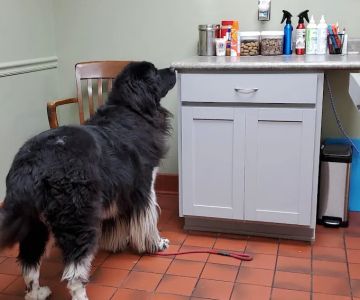Are Veterinary Designed Diets Best for Your Pet? A Deep Dive Into Pet Nutrition
- 1. Benefits of Veterinary Designed Diets
- 2. Types of Veterinary Designed Diets
- 3. When Should You Choose a Veterinary Diet?
- 4. My Personal Experience with Veterinary Designed Diets
As a pet owner, I’ve always wanted the best for my furry friends. Like many of you, I’ve often wondered if feeding my pet a veterinary designed diet is truly the best option. There are so many pet food options on the market, and it's easy to feel overwhelmed. However, after doing some research and speaking with my vet, I discovered just how beneficial these specially formulated diets can be. Veterinary designed diets aren’t just for sick or aging pets – they can help pets of all ages maintain optimal health.
1. Benefits of Veterinary Designed Diets
Veterinary designed diets are formulated with your pet’s health needs in mind. These diets are often created to manage or prevent specific health conditions, such as kidney disease, obesity, or allergies. But what sets them apart from regular pet food? Let’s break down the benefits.
Firstly, veterinary diets contain high-quality ingredients that are designed to address your pet’s unique nutritional needs. For example, a pet with a sensitive stomach may benefit from a diet that includes easily digestible proteins and prebiotics to support gut health. On the other hand, a pet with joint problems might need a diet with added glucosamine to promote cartilage health.
Another key benefit is that veterinary diets are often tailored to support overall wellness. For instance, weight management diets are designed to help your pet lose or maintain a healthy weight, reducing the risk of obesity-related conditions like diabetes and heart disease.
2. Types of Veterinary Designed Diets
There are several types of veterinary designed diets available, each formulated for specific health conditions or life stages. Some common categories include:
- Weight Management Diets: These diets are designed to promote weight loss or help maintain a healthy weight. They often contain lower calories and higher fiber content to help your pet feel full.
- Renal (Kidney) Support Diets: Renal diets are formulated for pets with kidney disease. They typically feature lower protein levels to reduce the kidneys' workload.
- Gastrointestinal Diets: These diets support pets with digestive issues. They often contain easily digestible ingredients and may include added probiotics to aid digestion.
- Allergy Relief Diets: Pets with food allergies or sensitivities benefit from these diets, which typically feature novel protein sources and limited ingredients to reduce allergic reactions.
- Senior Pet Diets: Older pets require specific nutrients, such as joint support supplements, lower calories, and easy-to-digest ingredients. Senior diets are designed with these needs in mind.
Veterinary diets are often more expensive than regular pet food, but when you consider the health benefits, the investment is well worth it. These diets help ensure your pet lives a longer, healthier life.
3. When Should You Choose a Veterinary Diet?
Choosing a veterinary designed diet may be necessary for pets dealing with specific health issues. If your pet has been diagnosed with a medical condition, your veterinarian may recommend a specialized diet to manage or alleviate symptoms. However, even if your pet isn’t sick, a veterinary diet might be the best option for overall health.
I decided to switch to a veterinary designed diet for my dog, who was becoming a bit overweight. My vet recommended a weight management formula to help him shed a few pounds. Over the next few months, I noticed significant improvements – he became more active, and his energy levels soared. It’s a great example of how these diets can help even healthy pets maintain their optimal weight.
On the other hand, if your pet has food allergies, a veterinary diet may help identify and eliminate the allergens causing discomfort. I’ve seen several cases where pets with chronic skin issues saw a dramatic improvement after switching to an allergy-friendly veterinary diet.
4. My Personal Experience with Veterinary Designed Diets
Let me tell you about my personal experience with veterinary diets. I’ve always been cautious about what I feed my pets, but when I switched my dog to a veterinary designed diet, I noticed significant improvements in both his physical health and behavior. For example, his coat became shinier, and he stopped scratching so much, which I later realized was due to a food sensitivity that was addressed by the new diet.
It was also interesting to see the difference in his overall energy levels. After a few weeks on the weight management formula, he started to run and play more than ever, which made me realize how much better he was feeling.
As for my cat, I chose a specialized kidney support diet after her vet diagnosed her with early kidney disease. Within months, her condition stabilized, and she showed fewer signs of discomfort. I can’t stress enough how much of a difference these diets made in her health and well-being.
In conclusion, while there are many pet food options on the market, veterinary designed diets stand out for their tailored nutritional formulas that can help address specific health concerns. Whether your pet is dealing with a medical issue or just needs a boost in overall health, these diets are worth considering. Consult your vet, and together, you can choose the best food to meet your pet’s needs.











